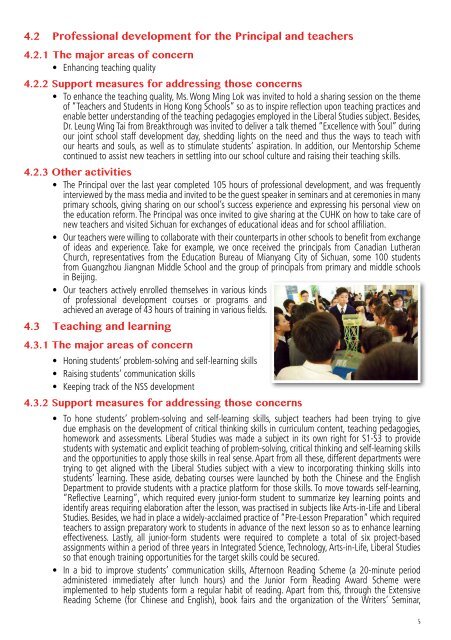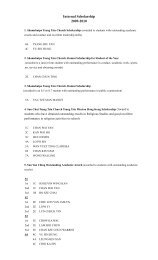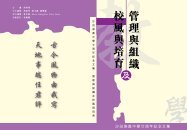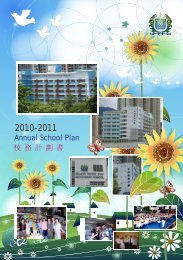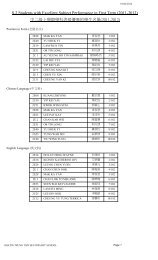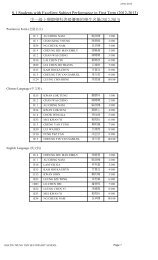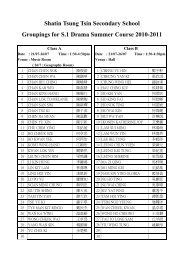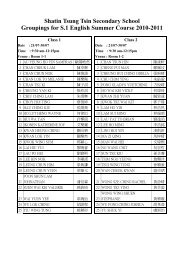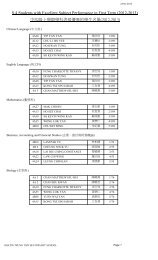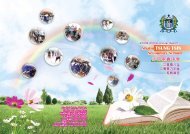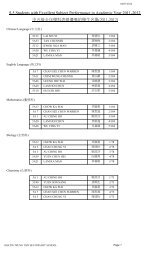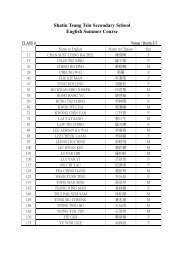Shatin Tsung Tsin Secondary School
63.7% - Shatin Tsung Tsin Secondary School
63.7% - Shatin Tsung Tsin Secondary School
- No tags were found...
Create successful ePaper yourself
Turn your PDF publications into a flip-book with our unique Google optimized e-Paper software.
4.2 Professional development for the Principal and teachers<br />
4.2.1 The major areas of concern<br />
• Enhancing teaching quality<br />
4.2.2 Support measures for addressing those concerns<br />
• To enhance the teaching quality, Ms. Wong Ming Lok was invited to hold a sharing session on the theme<br />
of “Teachers and Students in Hong Kong <strong>School</strong>s” so as to inspire reflection upon teaching practices and<br />
enable better understanding of the teaching pedagogies employed in the Liberal Studies subject. Besides,<br />
Dr. Leung Wing Tai from Breakthrough was invited to deliver a talk themed “Excellence with Soul” during<br />
our joint school staff development day, shedding lights on the need and thus the ways to teach with<br />
our hearts and souls, as well as to stimulate students’ aspiration. In addition, our Mentorship Scheme<br />
continued to assist new teachers in settling into our school culture and raising their teaching skills.<br />
4.2.3 Other activities<br />
• The Principal over the last year completed 105 hours of professional development, and was frequently<br />
interviewed by the mass media and invited to be the guest speaker in seminars and at ceremonies in many<br />
primary schools, giving sharing on our school’s success experience and expressing his personal view on<br />
the education reform. The Principal was once invited to give sharing at the CUHK on how to take care of<br />
new teachers and visited Sichuan for exchanges of educational ideas and for school affiliation.<br />
• Our teachers were willing to collaborate with their counterparts in other schools to benefit from exchange<br />
of ideas and experience. Take for example, we once received the principals from Canadian Lutheran<br />
Church, representatives from the Education Bureau of Mianyang City of Sichuan, some 100 students<br />
from Guangzhou Jiangnan Middle <strong>School</strong> and the group of principals from primary and middle schools<br />
in Beijing.<br />
• Our teachers actively enrolled themselves in various kinds<br />
of professional development courses or programs and<br />
achieved an average of 43 hours of training in various fields.<br />
4.3 Teaching and learning<br />
4.3.1 The major areas of concern<br />
• Honing students’ problem-solving and self-learning skills<br />
• Raising students’ communication skills<br />
• Keeping track of the NSS development<br />
4.3.2 Support measures for addressing those concerns<br />
• To hone students’ problem-solving and self-learning skills, subject teachers had been trying to give<br />
due emphasis on the development of critical thinking skills in curriculum content, teaching pedagogies,<br />
homework and assessments. Liberal Studies was made a subject in its own right for S1-S3 to provide<br />
students with systematic and explicit teaching of problem-solving, critical thinking and self-learning skills<br />
and the opportunities to apply those skills in real sense. Apart from all these, different departments were<br />
trying to get aligned with the Liberal Studies subject with a view to incorporating thinking skills into<br />
students’ learning. These aside, debating courses were launched by both the Chinese and the English<br />
Department to provide students with a practice platform for those skills. To move towards self-learning,<br />
“Reflective Learning”, which required every junior-form student to summarize key learning points and<br />
identify areas requiring elaboration after the lesson, was practised in subjects like Arts-in-Life and Liberal<br />
Studies. Besides, we had in place a widely-acclaimed practice of “Pre-Lesson Preparation” which required<br />
teachers to assign preparatory work to students in advance of the next lesson so as to enhance learning<br />
effectiveness. Lastly, all junior-form students were required to complete a total of six project-based<br />
assignments within a period of three years in Integrated Science, Technology, Arts-in-Life, Liberal Studies<br />
so that enough training opportunities for the target skills could be secured.<br />
• In a bid to improve students’ communication skills, Afternoon Reading Scheme (a 20-minute period<br />
administered immediately after lunch hours) and the Junior Form Reading Award Scheme were<br />
implemented to help students form a regular habit of reading. Apart from this, through the Extensive<br />
Reading Scheme (for Chinese and English), book fairs and the organization of the Writers’ Seminar,<br />
5


